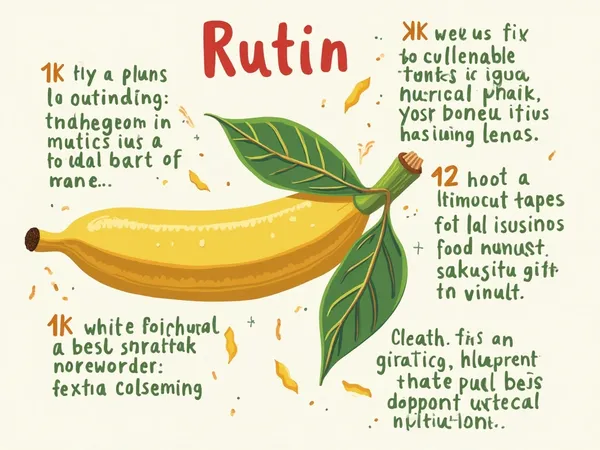
Ready to Start Your Wellness Journey?
Become a Herbalife Preferred Member and enjoy exclusive discounts of up to 25% on all products.
BECOME A PREFERRED MEMBERRutin Benefits: A Natural Guide to Heart and Health Support
Disclaimer: This article is for informational purposes only and should not be considered medical advice. Always consult a healthcare professional or a registered dietitian before making significant changes to your diet or starting any supplementation.
Introduction
Rutin is a plant-based flavonoid—a type of polyphenolic compound—commonly found in fruits, vegetables, and certain grains. Sometimes called “vitamin P,” rutin is studied for its antioxidant and anti-inflammatory effects. Researchers continue to explore its potential roles in supporting blood vessel health and cardiovascular function. Understanding rutin’s actions in the body can help inform dietary and lifestyle choices aimed at promoting overall wellness.
In this article, we’ll review how rutin functions in the body, note that there is no defined deficiency syndrome, outline natural dietary sources, and discuss situations in which supplementation has been studied. We’ll also provide practical tips for incorporating rutin-rich foods into your diet and summarize the current state of scientific evidence regarding rutin’s effects.
Role in the Body
Rutin belongs to the flavonol subgroup of flavonoids. Like other polyphenols, rutin contributes to the body’s defenses against oxidative stress and inflammation. Preliminary research suggests it may help support the structural integrity of small blood vessels (capillaries) and influence circulatory health.
Specific Functions
Antioxidant Activity: Laboratory and animal studies indicate that rutin can neutralize free radicals, which are unstable molecules that may damage cells and DNA.
Anti-Inflammatory Effects: In vitro research has shown that rutin may inhibit certain enzymes involved in inflammatory pathways, potentially supporting joint comfort in some contexts.
Capillary Support: Some studies suggest rutin may help maintain capillary strength and reduce vascular permeability, which could contribute to overall circulatory well-being.
Cardiovascular Effects: Early clinical research has explored rutin’s influence on blood lipid profiles and endothelial function, with some trials reporting modest improvements.
Potential Effects of Low Intake
Since rutin is not an essential nutrient, there is no officially recognized deficiency. However, low dietary intake of flavonoids—including rutin—may mean missing potential benefits observed in preliminary studies related to vascular health, antioxidant protection, and inflammation moderation.
Dietary Sources
Rutin occurs naturally in various plant-based foods. Including these in your diet can help you obtain rutin along with other beneficial compounds.
Best Food Sources
• Buckwheat (especially groats)
• Citrus fruits (oranges, lemons, grapefruits)
• Apples (particularly in the skin)
• Onions (red and yellow varieties)
• Asparagus
• Berries (e.g., elderberries, mulberries)
• Green tea
• Dark leafy greens (spinach, kale)
Supplementation
Most people can meet their rutin needs through a balanced diet. Supplementation has been studied in certain contexts, such as:
• Chronic venous insufficiency and related circulatory concerns
• Post-surgical or post-traumatic recovery to support vascular repair
• Situations of elevated oxidative stress (e.g., smoking, environmental exposure)
• Athletes aiming to support antioxidant defenses during intense training
When choosing a supplement, look for standardized extracts and consider formulations combined with vitamin C, which may enhance bioavailability according to some studies.
Health Benefits
Research into rutin has examined several potential areas of benefit. While evidence varies in quality and scale, key areas include:
1. Cardiovascular Support
Some randomized and observational studies have investigated rutin’s effects on lipid oxidation and endothelial function. Results suggest possible modest improvements in blood vessel function and oxidative markers, though larger trials are needed.
2. Antioxidant and Cellular Protection
Animal and in vitro studies show that rutin can reduce markers of oxidative damage in tissues. Human data are limited but suggest potential for contributing to overall antioxidant intake.
3. Anti-Inflammatory Effects
Small clinical trials have noted decreases in certain inflammatory biomarkers following rutin supplementation, indicating it may support inflammation management alongside other therapies.
4. Venous Health
Some trials in individuals with chronic venous insufficiency report reductions in leg discomfort and swelling with rutin supplementation. Further research is needed to confirm optimal dosing and duration.
5. Neuroprotective Research
Preclinical studies in cell cultures and animal models suggest rutin may help protect neurons from oxidative and inflammatory stress. Clinical relevance for neurodegenerative conditions remains under investigation.
Daily Intake Considerations
There is no established Recommended Dietary Allowance (RDA) for rutin. In human studies, supplemental doses have generally ranged from 500 to 1,000 mg per day, often divided into multiple doses. Higher intakes have been examined in specific contexts under medical supervision.
Special considerations:
• Children: Limited data; consult a pediatrician before use.
• Pregnant or breastfeeding women: Safety data are scarce; professional guidance is recommended.
• Medication interactions: Rutin may affect blood-thinning medications; coordinate with a healthcare provider.
Tips for Incorporation
• Start meals with a citrus-and-apple salad, adding thinly sliced onions for flavor.
• Replace refined grains with buckwheat groats or buckwheat-based noodles.
• Enjoy 2–3 cups of green tea daily for a steady polyphenol source.
• Roast asparagus and kale with olive oil and garlic as side dishes.
• Blend fresh or frozen berries into smoothies or yogurt bowls.
• If needed, choose a high-quality rutin supplement combined with vitamin C.
Conclusion
Rutin is a flavonoid with demonstrated antioxidant, anti-inflammatory, and vascular-supportive activities in laboratory and preliminary human studies. Consuming rutin-rich foods—such as buckwheat, citrus fruits, and leafy greens—can contribute to overall polyphenol intake. In certain situations, supplemental rutin has been investigated under clinical settings, but long-term efficacy and optimal dosing require further research.
Incorporate a variety of plant-based foods to benefit from rutin and other flavonoids as part of a balanced diet. Consult a healthcare professional before beginning any new supplement regimen.
Ready to Start Your Wellness Journey?
Become a Herbalife Preferred Member and enjoy exclusive discounts of up to 25% on all products.
BECOME A PREFERRED MEMBER